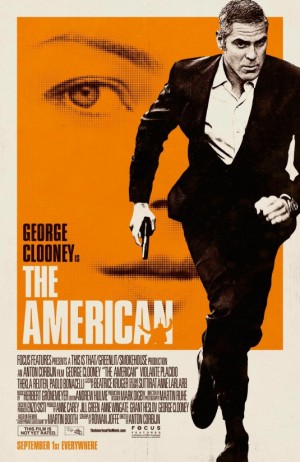But, just like a good spy film, we’ve been fooled by the movie’s studio, Focus Films. The American is anything but the typical spy-thriller. Namely because it leaves the “thrilling” part out.

Clooney plays the eponymous killer, Jack, an assassin who retreats to the Italian countryside after a botched mission leaves one too many dead. He’s spurred into action by his boss who assigns him one last job: to build a specifically calibrated weapon for a mysterious woman named Mathilde. At the same time, Jack meets a gorgeous, oft-disrobed Italian prostitute named Clara, and begins to question his own life as a killer in the wake of his failed mission.
The plotline is easily predictable from here on in, but what sets this film apart from the rest of the action-thrillers out there is quite simple: the overwhelming feeling of sorrow and gloom that seeps from every glacially-paced clip of celluloid. It’s short on the action, and short on the thrills. Instead, despite the utter blandness of the premise and storyline, director and music video producer Anton Corbijn manages to craft a powerful, deliberate character study that prefers to focus more on our professional killer slumped in bed moping than the moments he actually, you know, kills. Sounds like fun, right?
Well, The American isn’t fun. The film crawls through scenes methodically, each one laced with a downright depressing tone. While some films, like last year’s over-the-top action blockbuster Taken, seem to revel in the giddy joy of violence, The American avoids it at all costs. Far from not popcorn-munching, brain-deadening fare, the film is the movie to see if you have a yearning desire to feel something emotionally akin to losing your pet puppy.
We see that fatal mission in the first few minutes, which sets up a surprisingly subdued performance by Clooney that just about makes the movie tolerable for those willing to brave its icy depths. On a trip with his lover, Jack tenses perfectly as soon as the bullets start to fly. Strangely, he never snaps out of it. Jack exists only with a grimace permanently attached to that worn face we all know and love. The typical Clooney charm is missing and George looks every bit his age. Instead of wooing the ladies, Jack spends the majority of the movie alone, staring blankly into space or doing pull-ups in silence as he recounts the job gone bad. Clooney doesn’t dive over boxes for cover or confidently shout annoying catchphrases. He moves like water, silently flowing from one death to the next in the few moments we see him in action. Still, the stare never ceases, even in moments of supposed passion.
By the film’s climax, the wear and tear grows near unbearable for Jack. Shots of Clooney’s stone-set face hang a moment too long, begging him to finally break down in the face of impending doom. Yet the scene always cuts just as Jack looks like he may finally lose his nerve. His lip may quiver for half a second before the cut, or his eyebrows furrow. It’s no wonder that when Jack finally cracks in the film’s finale, it hits that much harder. One doubts if anyone other than Clooney could have done so much with so little. He strikes a fine line between over-acting the sorrow and just seeming bored that lands somewhere close to perfection and helps gives the film an emotional edge.
The supporting cast, sadly, just doesn’t match up. Violante Placido is palatable as Clara, but just barely. The love affair between Jack and Clara falls on the far side of believable, so we are subjected to jarring moments of faux-amour. It’s all a bit contrived and the film loses a lot of its considerable heft by getting bogged down in a love story that seems destined for disaster. The other roles fall flat as well. Clooney is the real powerhouse of the film, as well he should be. This is titled The American after all, not The Semi-Naked Love Interest or The Suspiciously Eastern-European Boss Named Pavel.
Most notable among the flops is Paolo Bonacelli as Father Benedetto, a character whose sole purpose, it appears, is to spout lines about morality and the redemption of Jack’s eternal soul as we the audience groan along to the clichéd lines heard in spy-thrillers since time immemorial.
“You cannot deny the existence of hell,” the priest intones, “You live in it. It is a place without love.”
Jesus. If I wanted the sermon, I’d go to service on Sundays, not the movies. In fact, it’d probably be more cheery than watching this gloom-fest.
To Corbijn’s credit, the movie oozes tension from just about every drawn-out scene. Even the long shots of a car driving through the hills betray the relative safety. The camera sits above small rocks and outcroppings in the foreground like a sniper watching its target. The choking atmosphere only builds as the film progresses. Soon, each door slam, each Vespa backfiring is enough to set one on edge.
What remains is a successful art-house film, but a failed thriller. The American shows about one hour and 30 minutes of George Clooney brooding; Grade-A brooding for sure, and probably the best brooding I’ve seen in a very long time, but it’s brooding nonetheless. The film basks in its nigh-unbearably slow pace, but the emotional payoff in the finale is just about worth it thanks to a superb lead performance. Just don’t go expecting to see George Clooney kick ass. You’re more likely to see George Clooney cry.
More melencholy then murderous, The American is a contemplative character study that would seem more at home in a European art house than in summer theaters: C+
